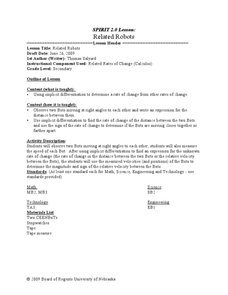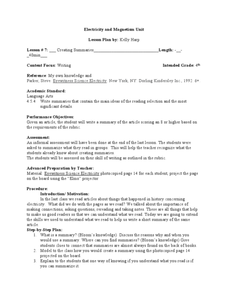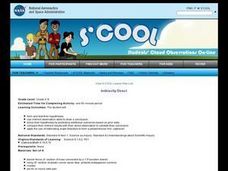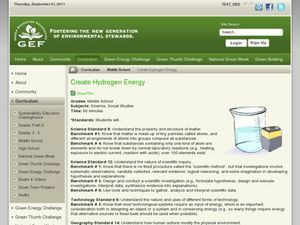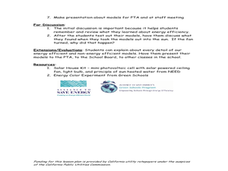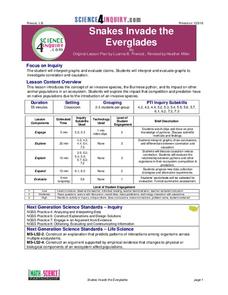Curated OER
Related Robots
Pupils solve problems using implicit differentiation. In this calculus lesson, students take the derivative to calculate the rate of change. They observe two robots and draw conclusion from the data collected on the two robots.
Curated OER
Checking Test Comparability/Scattergrams
Young scholars construct a scattergram graph. In this statistics lesson, students graph data by hand and using a spreadsheet program. They establish lines of best fit and draw conclusions using their graphs.
Curated OER
The Mathematics of Space and Place
Students investigate the measurements and geometry of the school grounds. They conduct inquiry while measuring the campus and some of the city blocks. Then students draw a map to scale and categorize property types using a pie graph.
Curated OER
Creating Summaries
Fourth graders generate written summaries from non-fiction articles. In this writing lesson, 4th graders determine what must be included in writing a good summary and then work in small groups to construct summaries after reading...
Curated OER
The Miracle Fish: Learning to Design an Experiment
Students investigate the behavior of a miracle fish. In this life science lesson, students write a procedure about the fish experiment. They collect data, construct graphs and draw conclusion at the end of the lab.
Curated OER
Prisoner of War
Learners study prison life during the Civil War. As a class, they brainstorm questions about prison life. In groups, students read primary source documents that give clues to life in a civil war prison. Learners draw conclusions and...
Curated OER
Health: How's Your Heart?
Students examine human physiology by measuring heart rates and conditions that influence them. To determine the difference in heart rates, they take their pulses at rest and after jogging in place. Once the data is collected, students...
Curated OER
Wandering Wild-oats
Learners observe wild-oat seeds. In this biology instructional activity, students watch how wild-oat seeds react to moisture and draw conclusions and make predictions.
Curated OER
Indirectly Direct
Students use prior knowledge of angle and lines as they conduct an experiment with a rolling marble to determine the shape of a mystery object located under a metal pie tin.
Physics Classroom
As the Crow Flies Lab
A simple, yet memorable, way of practicing with displacement vectors is described here. Divide your class into groups and assign each a different landmark on campus. They measure smaller legs of the path from the classroom to their...
Cornell University
Energy Changes in Chemical Reactions
The heat of solution measures how much thermal energy a dissolving substance consumes or gives off. The experiment demonstrates both endothermic and exothermic reactions. Scholars dissolve several substances, measure the temperature...
Curated OER
Create Hydrogen Energy
Learners complete an experiment to understand changes to the environment over time. In this hydrogen instructional activity, students discuss electrolysis and conduct an electrolysis experiment. Learners observe and record their...
Curated OER
Analysis of the Concentration of Sodium Chloride in a Product
Students design an experiment to test for the concentration of chloride in products. In this analysis of chloride concentration lesson plan, students develop and conduct an experiment to find the amount of chloride ion in a substance of...
Curated OER
Investigating Factors That Affect Cell Membrane Permeability
Cell membranes and the factors that affect its integrity are studied, with Beet tissue used as the model. A poster to display findings of the permeability of the membranes would clarify understanding and also allow a layer of language...
Curated OER
Current Sources of Energy to Maintain a Sustainable Future
In small groups, fourth graders identify different sources of renewable and non-renewable energy. They research the pros and cons of using each of these resources. They rank household appliances according to energy usage and efficiency....
Howard Hughes Medical Institute
Human Feet Are Strange
Feet are neat! So, if you've already walked the path of examining animal footprints with your class, put them in the shoes of early humans! A well-designed lesson incorporates video, discussion, and hands-on learning to demonstrate how...
Science 4 Inquiry
At the Top: A Bald Eagle's Diet
Bald eagles are opportunistic predators and eat fish as well as raccoons and other mammals. Pupils learn about bald eagle diets through a simple simulation and videos. They collect and analyze data to understand the adaptability of this...
Curated OER
Crafting Models of Efficiency
Students build and compare models of both an energy inefficient and efficient classroom. In this energy efficiency activity, students creatively use recycled materials to build two separate classroom models. They factor in concepts such...
Chicago Botanic Garden
Are All Plants Created Equal?
Photosynthesis requires energy and produces food, and cellular respiration produces energy and requires food. An interesting lesson plan analyzes the factors that affect the rates of photosynthesis and respiration. Classes spend one day...
Cornell University
Constructing and Visualizing Topographic Profiles
Militaries throughout history have used topography information to plan strategies, yet many pupils today don't understand it. Scholars use Legos and a contour gauge to understand how to construct and visualize topographic profiles. This...
Curated OER
Sink or Float?
Learners investigate whether different objects sink or float in water using the Scientific Method. They listen to the book "Christopher Columbus" by Stephen Krensky, identify the steps of the Scientific Method, conduct the sink or float...
Science 4 Inquiry
Snakes in the Everglades
The Burmese python is on the loose ... and he's hungry! Illustrate the differences between causative and correlative relationships through an inquiry lesson. Pupils examine several sources of information to determine if there is a...
Curated OER
Simple Machines
Have your class conduct research to learn all they can about simple machines. They use the web, take notes from a video, write a script, then make a film describing various simple machines found in real life. These videos are then...
NTTI
Vectors: Traveling, But in What Direction
High schoolers watch a video of real-world situations regarding speed, direction, velocity, force, etc. and answer questions while viewing. They then practice drawing and using vectors to solve more real-world problems.


